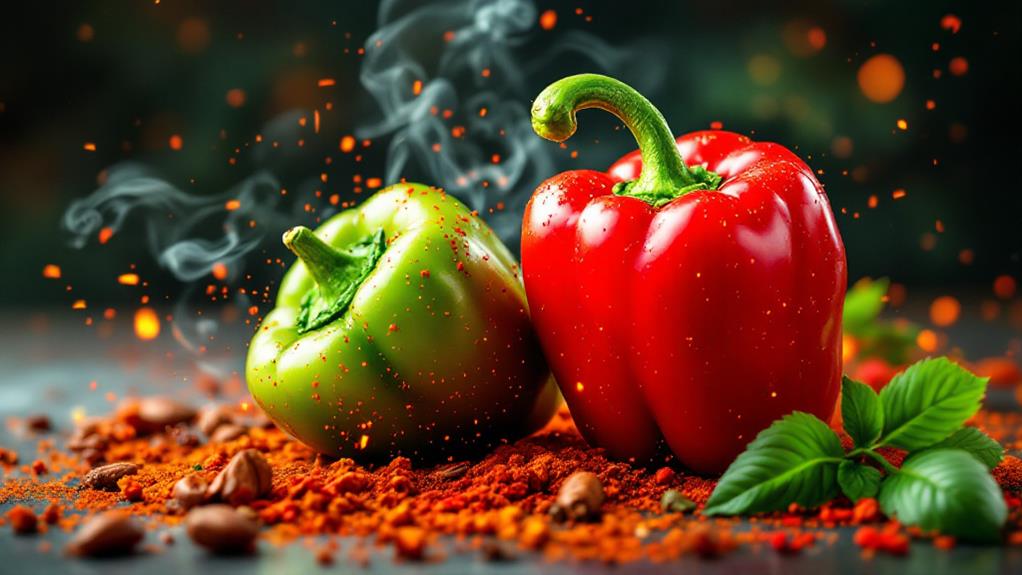The Benefits of Consuming Peppers: Spice Up Your Health

Adding peppers to your meals can do wonders for your health. They improve flavor while providing significant health benefits. Capsaicin, the active component in peppers, not only helps relieve pain but also enhances your immune system thanks to its antioxidants and vitamins. It can increase your metabolism, aiding in weight management, and supports digestive and cardiovascular health. Peppers also act as a natural decongestant, improving respiratory functions. They're low in calories and high in vital nutrients like vitamins A, C, and E. To uncover how peppers can spice up your health in even more ways, investigate further.
Pain Relief With Capsaicin
For those seeking natural pain relief, capsaicin, the active compound in hot peppers, offers a compelling solution. By altering pain signals, capsaicin tricks your brain into perceiving heat instead of pain, providing an effective way to tackle chronic discomfort. Regardless of whether you're dealing with arthritis, fibromyalgia, or other chronic pain conditions, capsaicin can considerably reduce your discomfort levels. It works by depleting substance P, a neurotransmitter responsible for carrying pain signals, thereby easing the pain associated with conditions like shingles and HIV neuropathy.
Topical applications of capsaicin creams have been particularly successful, with studies showing a reduction in discomfort from arthritis by up to 50%. This makes it a viable option for managing chronic pain. Furthermore, capsaicin sprays have shown remarkable results in treating headaches, with 70% of participants experiencing total relief from migraines and other types of headaches.
Regular use of capsaicin can improve its effectiveness, making it an invaluable tool in your pain management arsenal. By incorporating hot peppers into your routine, you can harness the power of capsaicin to keep chronic pain at bay and enhance your general quality of life.
Boosting Immunity and Health
Hot peppers aren't just about spice—they're a powerhouse for enhancing your immune system and general health. Packed with indispensable vitamins A, C, and E, peppers play a significant role in fortifying your immune system and combating oxidative stress. These vitamins are critical for maintaining a robust defense against infections and illnesses, ensuring your body stays resilient and healthy.
Capsaicin, the active component in peppers, offers potent antioxidant properties that protect your cells from damage. This protection may even contribute to cancer prevention, adding another layer of health benefits to your diet. Additionally, the anti-inflammatory effects of capsaicin can elevate your immune function, potentially lowering the risk of chronic diseases linked to inflammation.
Metabolism and Weight Control

Metabolism is the key player in relation to managing your weight, and peppers can give it a boost. The secret weapon in peppers is capsaicin, which can increase body temperature and metabolic rate. When you eat spicy foods, your metabolism can get a temporary lift in calorie burning by up to 10%. This can be a helpful tool in your weight loss expedition.
Besides the immediate calorie-burning effects, capsaicin plays a role in appetite suppression. By reducing your hunger, you may naturally consume fewer calories, making it easier to stick to your weight management goals. The heat sensation you experience after eating peppers is due to increased thermogenesis—your body's process of generating heat—which helps burn extra calories.
While the immediate effects are promising, research is still ongoing to understand capsaicin's long-term impact on weight loss and its potential in obesity management. However, incorporating peppers into your diet might just be the spicy kick your metabolism needs to help you manage your weight more effectively. So, if you're looking for a natural way to support your metabolism, consider adding a little heat to your meals.
Respiratory Benefits
While enhancing your metabolism is a spicy perk of consuming peppers, they also offer notable respiratory benefits. Capsaicin, the active compound in hot peppers, acts as a natural decongestant. It helps clear nasal congestion and improves airflow in your respiratory system. If you're struggling with non-allergic rhinitis, spicy peppers might provide relief from nasal discomfort and congestion. Anecdotal evidence even suggests that capsaicin's effects on respiratory health can last for several months after initial use.
In addition to these perks, peppers are rich in beta carotene and antioxidants that support your immune response. These compounds help combat colds and flu symptoms, providing an extra layer of protection to your respiratory health.
Here's how peppers can benefit your respiratory system:
- Natural Decongestant: Capsaicin helps clear nasal passages and ease nasal congestion.
- Symptom Relief: Provides relief from non-allergic rhinitis symptoms, reducing discomfort.
- Immune Support: Antioxidants in peppers bolster your immune response.
However, exercise caution. If you have respiratory sensitivities, initial discomfort from capsaicin might occur before relief is experienced. Always start with small amounts to gauge your body's reaction.
Culinary Uses and Safety

In regard to adding a kick to your meals, peppers pack a punch in both flavor and color, making them a staple in diverse global cuisines like Thai and Indian. Their culinary uses extend beyond just taste; hot peppers can transform dishes with lively hues and bold flavors. They can be effortlessly added to your cooking routine by using frozen chopped peppers, which save time and guarantee you always have some on hand.
When working with superhot peppers, keep in mind that capsaicin, the compound responsible for their heat, can irritate your skin. Make certain you wear gloves to avoid any discomfort. Should you experience the fiery sensation of hot peppers, reach for dairy products like milk to help neutralize the burn—water won't do the trick.
While peppers can enhance your culinary creations, it's vital to consume them in moderation. Overindulging can lead to gastrointestinal discomfort, so balance is key. By using peppers wisely, you can enjoy their flavorful benefits without any unwanted side effects. As you spice up your meals, keep these safety tips in mind to savor the delicious and colorful world of peppers safely.
Nutritional Value of Peppers
Peppers are a powerhouse of nutrition, offering an impressive array of significant vitamins and minerals. They're packed with indispensable vitamins A, C, and E, which are crucial for enhancing your immune system and improving skin health. Believe it or not, hot peppers contain more vitamin C than oranges, giving you over 100% of the recommended daily intake in just one serving. This makes them an excellent supplement to your diet if you're looking to strengthen your immune function.
Including peppers in your meals also means you're consuming antioxidants that combat oxidative stress and promote cellular protection. These antioxidants are key players in maintaining general health. Plus, peppers are low in calories and high in dietary fiber, which aids digestion and supports weight management goals.
Consider these nutritional benefits:
- High Vitamin C Content: Exceeds that of oranges, enhancing immunity.
- Rich in Antioxidants: Offers protection against oxidative stress.
- Low Calories, High Fiber: Ideal for weight management and digestive health.
Furthermore, peppers provide significant minerals like potassium and magnesium, necessary for healthy muscle and nerve function. Enjoy all these benefits by incorporating peppers into your meals today!
Cultural Significance of Spices

Throughout history, spices, including hot peppers, have been more than just flavor improvements in diverse global cuisines. They've played a vital role in enhancing taste and preserving food, especially in regions with warm climates where refrigeration is scarce. You'll find that many culinary traditions celebrate spices not only for their taste but also for their medicinal properties. This reflects a deep-rooted cultural belief in their health benefits, demonstrating how integral they are to numerous societies.
In many cultures, spices hold immense cultural significance, serving as symbols of hospitality and community during rituals and traditional celebrations. They're not just ingredients; they're a bridge that connects individuals and communities through social gatherings. Shared meals featuring flavorful dishes often become memorable events, fostering connections and strengthening bonds.
The use of spices differs dramatically across regions, showcasing local agricultural practices and biodiversity. This variation allows each culture to adapt spices, creating unique culinary identities that express their distinct heritage. By accepting these diverse spice profiles, you can appreciate the rich tapestry of global cuisines. Spices invite you to investigate different culinary worlds and accept the cultural significance they bring to your dining table.
Potential Risks of Spicy Foods
Consuming spicy foods can be a double-edged sword, offering exciting flavors but also potential risks. You might savor the heat, but excessive consumption can lead to gastrointestinal discomfort. This includes symptoms like stomach upset, nausea, and vomiting, as your brain interprets pain signals. For those with ulcers or acid reflux, spicy foods can worsen these conditions. Such foods may trigger heartburn or indigestion, so moderation is essential.
Let's break down potential risks:
- Gastrointestinal Discomfort: Overindulging in spicy foods can lead to stomach upset. This is often due to the irritation of the stomach lining, causing nausea or vomiting.
- Ulcers and Acid Reflux: If you have ulcers or suffer from acid reflux, spicy foods can exacerbate these problems. Increased acidity can lead to more discomfort, so it's wise to limit your intake.
- Heartburn and Indigestion: Sensitive individuals might experience heartburn after consuming spicy dishes. The burning sensation is linked to acid reflux, making moderation vital.
To enjoy spicy foods with fewer risks, consider choosing peppers lower on the Scoville scale. This small adjustment can help reduce the likelihood of discomfort, allowing you to enjoy the heat without the hurt.
Digestive and Cardiovascular Health

While spicy foods can pose certain risks, they also offer remarkable benefits for both digestive and cardiovascular health. Capsaicin, the compound that gives hot peppers their fiery kick, acts as an anti-irritant that promotes digestive health. It stimulates saliva and gastric juice production, aiding digestion and helping treat ulcers. Capsaicin also reduces acidity in the digestive tract, which can soothe your stomach. Additionally, the antioxidant properties of hot peppers improve gut health by balancing gut microbiota, which promotes better nutrient absorption.
When it comes to cardiovascular health, hot peppers shine. Capsaicin's ability to dilate blood vessels improves blood flow and elasticity, contributing to lower blood pressure levels. This dilation reduces lipid deposits and lowers blood serum cholesterol, crucial in preventing heart disease. Regular consumption of chili peppers has been linked to a reduced risk of cardiovascular mortality, showcasing their protective effects on heart health.
Incorporating hot peppers into your diet can, consequently, be a flavorful strategy to support both digestive and heart health. By embracing the spicy side of life, you might just improve your body's comprehensive wellness and longevity.




